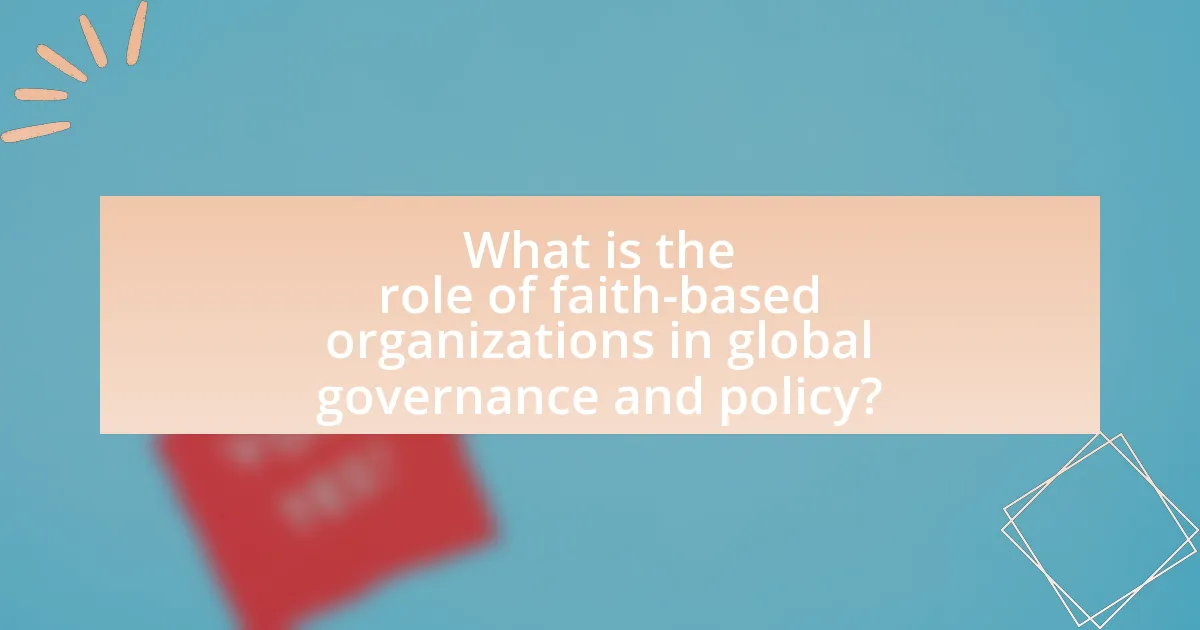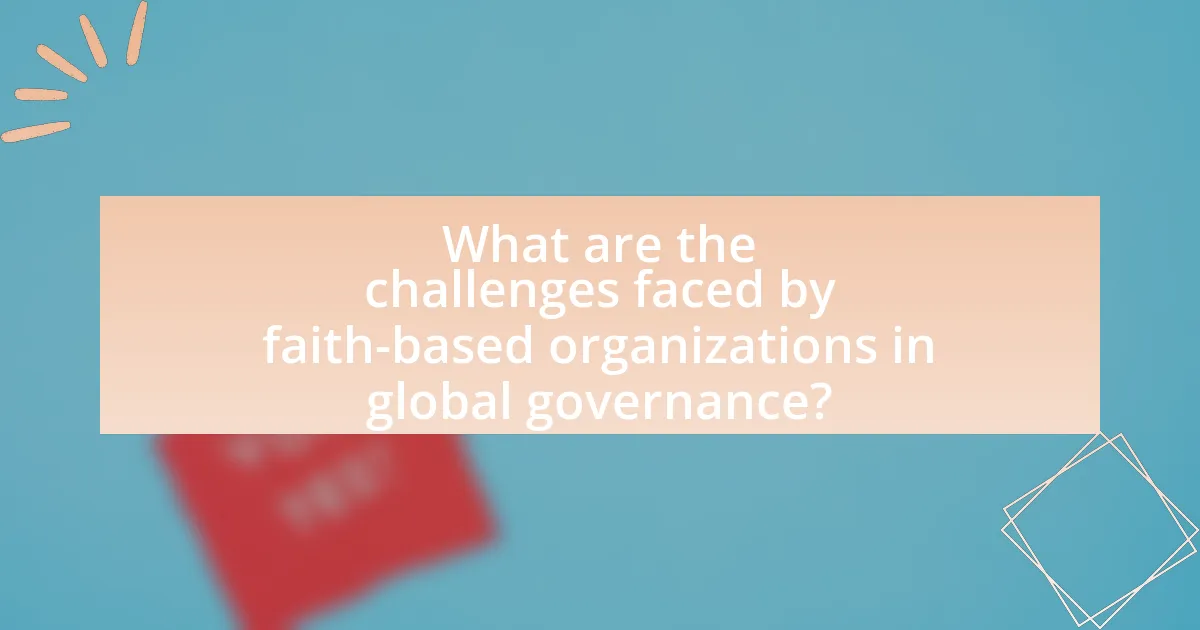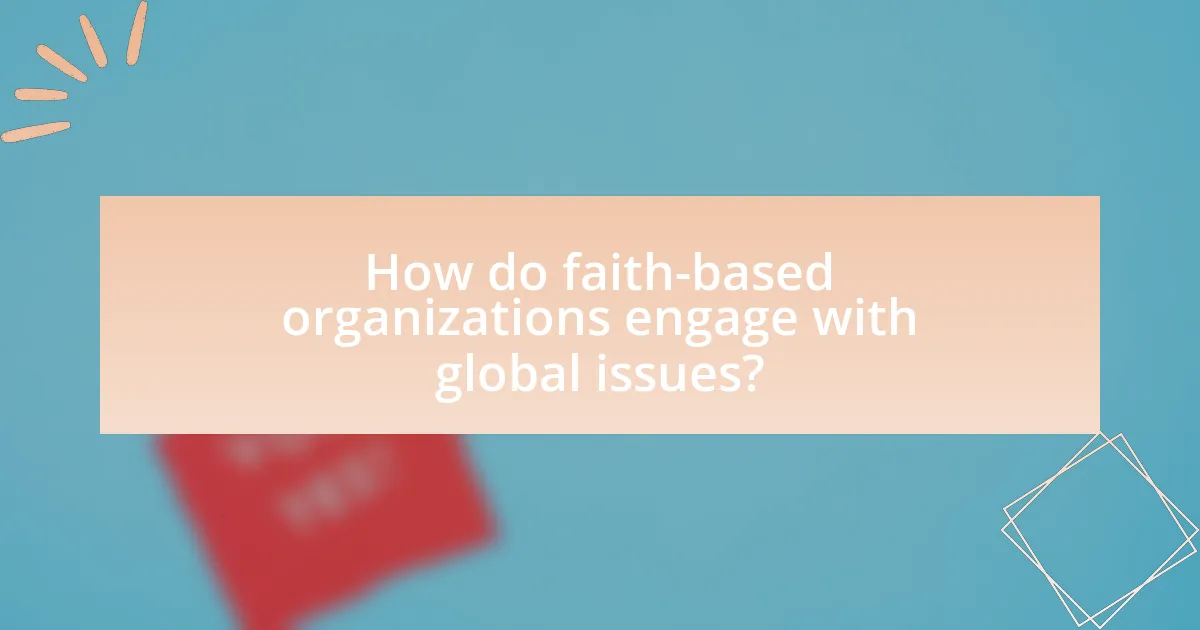Faith-based organizations play a crucial role in global governance and policy by advocating for social justice, providing humanitarian assistance, and influencing ethical standards in decision-making. They mobilize resources and engage in partnerships with governmental bodies to address pressing global issues such as poverty, health care, and education. Their participation in international forums, like the United Nations, highlights their impact on policy discussions related to climate change and human rights. Despite facing challenges such as limited resources and political dynamics, these organizations contribute significantly to humanitarian efforts and peacebuilding initiatives, emphasizing the importance of moral perspectives in governance.

What is the role of faith-based organizations in global governance and policy?
Faith-based organizations play a significant role in global governance and policy by influencing social change, advocating for human rights, and providing humanitarian assistance. These organizations often mobilize resources and volunteers, leveraging their networks to address issues such as poverty, health, and education on a global scale. For instance, the World Council of Churches and Catholic Relief Services have been instrumental in shaping policies related to climate change and social justice, demonstrating their capacity to impact international discussions and frameworks. Their involvement in global governance is further evidenced by their participation in forums like the United Nations, where they advocate for policies that align with their ethical and moral values, thus contributing to a more inclusive approach to global challenges.
How do faith-based organizations influence global governance?
Faith-based organizations influence global governance by advocating for social justice, humanitarian aid, and ethical standards in policy-making. These organizations often mobilize resources and networks to address global issues such as poverty, health crises, and human rights violations. For instance, the World Council of Churches and Catholic Relief Services have played significant roles in shaping international discussions on climate change and refugee rights, demonstrating their capacity to impact policy frameworks. Their influence is further evidenced by their participation in global forums, such as the United Nations, where they contribute to dialogues that shape international norms and agreements, thereby reinforcing the importance of moral and ethical considerations in governance.
What are the key functions of faith-based organizations in this context?
Faith-based organizations play crucial roles in global governance and policy by providing humanitarian aid, advocating for social justice, and fostering community engagement. These organizations often mobilize resources and volunteers to address issues such as poverty, health care, and education, significantly impacting local and global communities. For instance, according to a report by the World Bank, faith-based organizations contribute approximately 20% of global humanitarian aid, demonstrating their vital role in disaster response and recovery efforts. Additionally, they serve as platforms for dialogue and collaboration among diverse stakeholders, promoting peacebuilding and conflict resolution initiatives.
How do faith-based organizations collaborate with governmental bodies?
Faith-based organizations collaborate with governmental bodies through partnerships that address social issues, provide services, and influence policy. These collaborations often involve joint initiatives in areas such as disaster relief, healthcare, and education, where faith-based organizations leverage their community connections and expertise. For example, in the United States, the Faith-Based and Community Initiative established by the Bush administration in 2001 aimed to enhance collaboration between faith-based organizations and government agencies, allowing these organizations to access federal funding for social services. This initiative demonstrated the effectiveness of faith-based organizations in delivering community services, as evidenced by their significant role in programs like the Emergency Food and Shelter Program, which has distributed millions in aid.
Why are faith-based organizations important in policy-making?
Faith-based organizations are important in policy-making because they often represent the values and needs of diverse communities, influencing social change and public policy. These organizations mobilize resources, provide essential services, and advocate for marginalized populations, thereby shaping legislative agendas. For instance, faith-based groups played a crucial role in the abolition of slavery and the civil rights movement, demonstrating their historical impact on policy. Additionally, studies show that faith-based organizations contribute to community resilience and social cohesion, which are vital for effective governance and policy implementation.
What unique perspectives do faith-based organizations bring to policy discussions?
Faith-based organizations bring moral and ethical perspectives to policy discussions, emphasizing values such as compassion, justice, and community welfare. These organizations often advocate for marginalized populations, drawing on their religious teachings to highlight social issues like poverty, inequality, and human rights. For instance, the World Council of Churches has historically influenced global policy on issues like climate change and social justice by framing these challenges within a moral context, urging policymakers to consider the ethical implications of their decisions. This unique approach not only enriches the dialogue but also encourages a holistic view of policy that integrates spiritual and ethical dimensions alongside economic and political considerations.
How do faith-based organizations address global challenges through policy?
Faith-based organizations address global challenges through policy by advocating for social justice, humanitarian aid, and sustainable development. These organizations leverage their moral authority and community networks to influence policymakers and promote ethical frameworks that align with their values. For instance, the World Council of Churches has actively engaged in climate change discussions, emphasizing the need for environmental stewardship based on theological principles. Additionally, faith-based organizations often collaborate with international bodies, such as the United Nations, to address issues like poverty and human rights, exemplified by the role of Catholic Relief Services in global health initiatives. Their unique position allows them to mobilize resources and grassroots support, effectively shaping policies that tackle pressing global issues.

What are the challenges faced by faith-based organizations in global governance?
Faith-based organizations face several challenges in global governance, including limited resources, lack of recognition, and differing priorities among stakeholders. Limited resources hinder their ability to effectively participate in governance processes, as many faith-based organizations operate on tight budgets and rely on donations. Additionally, these organizations often struggle for recognition in formal governance structures, which can marginalize their contributions and insights. Differing priorities among various stakeholders, including governments and international organizations, can lead to conflicts in objectives, making it difficult for faith-based organizations to align their missions with broader governance goals. These challenges can impede their effectiveness and influence in global governance discussions.
How do political dynamics affect faith-based organizations’ roles?
Political dynamics significantly influence the roles of faith-based organizations by shaping their engagement in governance and policy-making processes. For instance, during periods of political instability or conflict, faith-based organizations often step in to provide humanitarian aid and social services, filling gaps left by governmental institutions. A study by the World Bank in 2018 highlighted that faith-based organizations played crucial roles in disaster response and community rebuilding in regions affected by political turmoil, demonstrating their adaptability and importance in such contexts. Additionally, political support or opposition can determine the level of funding and resources available to these organizations, impacting their capacity to operate effectively.
What obstacles do faith-based organizations encounter in different regions?
Faith-based organizations encounter various obstacles in different regions, including legal restrictions, cultural opposition, and resource limitations. In regions with strict secular laws, such as parts of Europe, these organizations may face legal barriers that hinder their ability to operate freely. For instance, in countries like France, laws on laïcité restrict religious expressions in public life, impacting the activities of faith-based organizations. Additionally, in regions with strong cultural opposition, such as certain areas in the Middle East, faith-based organizations may experience hostility or violence, limiting their outreach and effectiveness. Furthermore, resource limitations, particularly in developing regions, can restrict their capacity to provide services, as seen in sub-Saharan Africa where many faith-based organizations struggle with funding and infrastructure challenges. These obstacles collectively hinder the ability of faith-based organizations to fulfill their roles in global governance and policy effectively.
How do internal conflicts within faith communities impact their governance roles?
Internal conflicts within faith communities significantly undermine their governance roles by creating divisions that hinder decision-making and weaken collective authority. These conflicts often lead to fragmented leadership, where differing factions prioritize their agendas over unified community goals, resulting in ineffective governance structures. For instance, a study by the Pew Research Center in 2017 highlighted that faith communities experiencing internal strife were less likely to engage in collaborative initiatives, which are essential for effective governance. Additionally, such conflicts can diminish the community’s credibility and influence in broader policy discussions, as external stakeholders may perceive them as unstable or disorganized.
What ethical considerations arise for faith-based organizations in policy-making?
Faith-based organizations face several ethical considerations in policy-making, primarily concerning the balance between religious beliefs and secular governance. These organizations must navigate the challenge of ensuring that their policies do not impose specific religious doctrines on diverse populations, which can lead to discrimination or exclusion of non-adherents. For instance, when advocating for social policies, faith-based organizations must consider the implications of their positions on issues like reproductive rights or LGBTQ+ rights, as these can conflict with their religious teachings while also impacting the rights of individuals in a pluralistic society.
Additionally, transparency and accountability are crucial ethical considerations; faith-based organizations should disclose their funding sources and decision-making processes to maintain public trust. The intersection of faith and public policy can also raise questions about the separation of church and state, necessitating careful consideration to avoid perceived bias or favoritism in governmental support. These ethical dilemmas highlight the need for faith-based organizations to engage in inclusive dialogue and seek common ground with various stakeholders to promote policies that respect both their values and the rights of all individuals.
How do faith-based organizations balance religious beliefs with secular policies?
Faith-based organizations balance religious beliefs with secular policies by integrating their core values into their operational frameworks while adhering to legal and ethical standards. These organizations often engage in dialogue with policymakers to advocate for policies that reflect their beliefs, ensuring that their religious principles inform their actions without violating secular laws. For instance, many faith-based organizations participate in social services, such as healthcare and education, where they align their mission with public needs, demonstrating their commitment to both faith and community welfare. This dual approach allows them to maintain their religious identity while fulfilling their responsibilities within a secular governance structure.
What accountability measures are in place for faith-based organizations in governance?
Faith-based organizations in governance are subject to various accountability measures, including regulatory oversight, financial transparency requirements, and adherence to ethical standards. Regulatory oversight often involves compliance with national laws that govern non-profit organizations, which may include regular audits and reporting obligations to ensure proper use of funds. Financial transparency requirements mandate that these organizations disclose their financial statements and funding sources, allowing stakeholders to assess their financial health and integrity. Additionally, adherence to ethical standards is enforced through codes of conduct established by both the organizations themselves and external accrediting bodies, ensuring that their operations align with moral and ethical expectations within the communities they serve.

How do faith-based organizations engage with global issues?
Faith-based organizations engage with global issues primarily through advocacy, humanitarian aid, and community development initiatives. These organizations leverage their moral authority and extensive networks to influence policy decisions, mobilize resources, and provide essential services in areas such as poverty alleviation, health care, and education. For instance, organizations like World Vision and Catholic Relief Services have been instrumental in responding to crises such as famine and natural disasters, delivering aid to millions globally. Their efforts are often supported by research indicating that faith-based organizations can effectively reach marginalized populations, as they are trusted by communities and can operate in regions where secular entities may face challenges.
What specific global issues do faith-based organizations address?
Faith-based organizations address specific global issues such as poverty alleviation, healthcare access, education, human rights, and conflict resolution. These organizations often mobilize resources and volunteers to provide humanitarian aid, advocate for social justice, and promote peacebuilding initiatives. For instance, according to a report by the World Bank, faith-based organizations play a crucial role in delivering health services in underserved communities, significantly impacting maternal and child health outcomes. Additionally, the United Nations recognizes the contributions of faith-based organizations in promoting sustainable development goals, particularly in areas like gender equality and environmental stewardship.
How do faith-based organizations contribute to humanitarian efforts?
Faith-based organizations contribute to humanitarian efforts by mobilizing resources, providing services, and fostering community resilience. These organizations often leverage their extensive networks to deliver aid quickly during crises, as seen in the response to the 2010 Haiti earthquake, where faith-based groups played a crucial role in relief efforts. Additionally, they offer essential services such as healthcare, education, and food security, often reaching marginalized populations that other entities may overlook. Research indicates that faith-based organizations are involved in approximately 40% of global humanitarian assistance, demonstrating their significant impact in addressing urgent needs and promoting long-term development.
What role do faith-based organizations play in promoting peace and conflict resolution?
Faith-based organizations play a crucial role in promoting peace and conflict resolution by leveraging their moral authority, community networks, and commitment to social justice. These organizations often act as mediators in conflicts, facilitating dialogue between opposing parties and fostering reconciliation through shared values and beliefs. For instance, the interfaith initiatives led by organizations like the World Council of Churches have successfully brought together diverse religious groups to address communal tensions and promote understanding. Additionally, faith-based organizations often engage in grassroots peacebuilding efforts, providing humanitarian aid and advocating for non-violent solutions, as seen in the work of Catholic Relief Services in conflict zones. Their unique position allows them to mobilize communities, influence policy, and contribute to sustainable peace efforts.
How can faith-based organizations enhance their impact on global governance?
Faith-based organizations can enhance their impact on global governance by leveraging their extensive networks, moral authority, and community engagement to influence policy and decision-making processes. These organizations often possess deep-rooted connections within communities, allowing them to mobilize grassroots support for global issues such as poverty alleviation, human rights, and climate change. For instance, the World Council of Churches has played a significant role in advocating for social justice and peacebuilding initiatives, demonstrating how faith-based entities can effectively engage with international bodies like the United Nations. Additionally, their ability to foster dialogue among diverse stakeholders, including governments, civil society, and the private sector, positions them as crucial intermediaries in addressing complex global challenges.
What strategies can faith-based organizations adopt to improve collaboration with other stakeholders?
Faith-based organizations can improve collaboration with other stakeholders by establishing formal partnerships, engaging in dialogue, and leveraging their unique community connections. Formal partnerships, such as memorandums of understanding, create clear frameworks for collaboration, ensuring that roles and responsibilities are defined. Engaging in dialogue with stakeholders, including government entities and NGOs, fosters mutual understanding and aligns objectives, as evidenced by initiatives like the Interfaith Alliance, which promotes cooperation among diverse groups. Additionally, faith-based organizations can leverage their community connections to mobilize resources and volunteers, enhancing outreach and impact, as demonstrated by the success of faith-based disaster relief efforts that often rely on local networks for effective response.
How can faith-based organizations leverage technology for better governance outcomes?
Faith-based organizations can leverage technology for better governance outcomes by utilizing digital platforms for transparency, communication, and community engagement. For instance, implementing online reporting systems can enhance accountability by allowing stakeholders to track the use of resources and decision-making processes. A study by the World Bank indicates that transparency initiatives can lead to a 20% increase in public trust in governance. Additionally, social media can facilitate real-time communication between organizations and their communities, fostering greater participation in governance. Research shows that organizations that engage with their communities through technology can improve policy advocacy efforts, leading to more inclusive governance outcomes.
What best practices can faith-based organizations follow in global governance?
Faith-based organizations can follow several best practices in global governance, including fostering interfaith dialogue, advocating for social justice, and engaging in collaborative partnerships. Fostering interfaith dialogue allows these organizations to build bridges across diverse communities, promoting understanding and cooperation, which is essential for addressing global challenges. Advocating for social justice aligns with the moral imperatives of many faith traditions, enabling organizations to address issues such as poverty, inequality, and human rights violations effectively. Engaging in collaborative partnerships with governments, NGOs, and other stakeholders enhances their influence and reach, as evidenced by initiatives like the United Nations’ Faith for Earth Coalition, which demonstrates the impact of collective action in environmental governance. These practices not only strengthen the role of faith-based organizations in global governance but also contribute to more inclusive and effective policy-making processes.